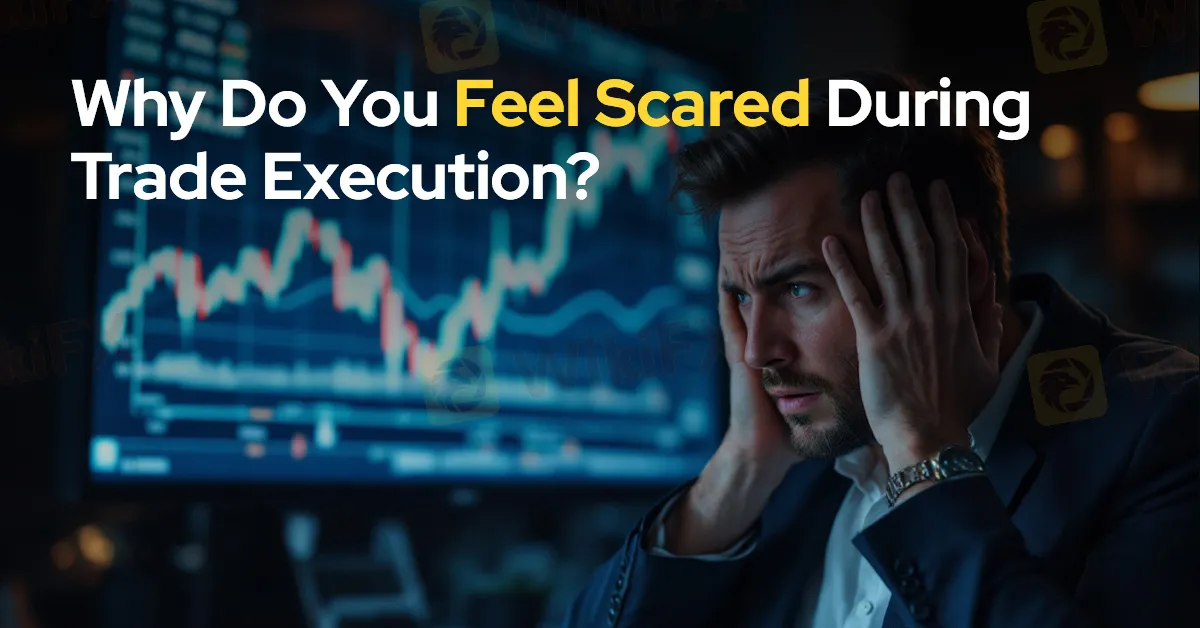简体中文
繁體中文
English
Pусский
日本語
ภาษาไทย
Tiếng Việt
Bahasa Indonesia
Español
हिन्दी
Filippiiniläinen
Français
Deutsch
Português
Türkçe
한국어
العربية
Why Do You Feel Scared During Trade Execution?
Abstract:Trade execution is a pivotal moment for traders. It is when analysis turns into action, and potential profits or losses become reality. However, for many traders, this moment is accompanied by fear. Why does this happen, and how can you address it?

Trade execution is a pivotal moment for traders. It is when analysis turns into action, and potential profits or losses become reality. However, for many traders, this moment is accompanied by fear. Why does this happen, and how can you address it? Understanding the psychological, emotional, and risk management aspects of trading is essential to mastering this fear and making more confident decisions in the financial markets.

At its core, fear during trade execution stems from uncertainty. The market is unpredictable, and no analysis can guarantee outcomes. This uncertainty triggers a natural response rooted in our survival instincts: the fear of loss. For traders, this can manifest as hesitation, second-guessing, or even paralysis when its time to click that “Buy” or “Sell” button.
Additionally, past experiences play a role. Traders who have faced significant losses may develop a psychological barrier to executing trades, fearing a repeat of their mistakes. This is compounded by the pressure of potential financial loss, which can feel overwhelming, especially for those new to trading or operating with large positions relative to their account size.
Trading is an emotional endeavour. The fear of being wrong can evoke anxiety, while the hope of being right can create excitement. Unfortunately, these emotions can cloud judgement, leading traders to deviate from their strategies. Fear during execution is often linked to the potential regret of making a losing trade, which can weigh heavily on a traders mind.
For some, this fear can escalate into a cycle of avoidance. Traders may skip opportunities altogether, unable to face the emotional turmoil of executing trades. Conversely, others may overtrade, attempting to “win back” what they fear losing—a dangerous practice that often leads to greater losses.
One of the most effective ways to combat fear during trade execution is robust risk management. Fear often arises from the perceived consequences of a trade going wrong. By implementing strict risk management practices, such as setting stop-loss orders, using appropriate position sizing, and maintaining a healthy risk-to-reward ratio, traders can limit potential losses and reduce the emotional weight of each trade.
A clearly defined trading plan also helps mitigate fear. When you know exactly why you‘re entering a trade, where you’ll exit, and how much you‘re willing to risk, there’s less room for uncertainty. This structure provides a sense of control, which can alleviate the anxiety of execution.
Fear during trade execution is not inherently bad as it is a sign that you care about your financial decisions. However, it is crucial to manage this fear so it doesnt hinder your progress. Focus on continuous learning, practise discipline, and remember that no trader wins all the time.
Trading is as much a psychological battle as it is a technical one. By understanding the roots of your fear and taking steps to address it, you can transform this emotion from a hindrance into a tool for cautious and thoughtful decision-making. Above all, do not rush your trading journey. Mastery takes time, and patience is the foundation of long-term success.

Disclaimer:
The views in this article only represent the author's personal views, and do not constitute investment advice on this platform. This platform does not guarantee the accuracy, completeness and timeliness of the information in the article, and will not be liable for any loss caused by the use of or reliance on the information in the article.
Read more

Gold Prices Pull Back, Near Four-Week Low Amid Easing Risk Sentiment
As risk aversion fades and investors turn their attention to U.S. inflation data, gold prices retreat sharply, falling to their lowest levels in nearly a month.

The Shame of Being Scammed: Don't Ever Stay Silent
It often starts with a promise of fast profits, low risk, and a slick-looking platform that seems too good to ignore. Before long, your savings are gone, the website vanishes, and so does the person who convinced you to invest. What’s worse? You never tell a soul. Every year, countless people fall into the trap of fraudulent investment schemes, yet most never speak up. Why? And what does this silence mean for the rest of us?

TSMC to Inject $10 Billion into Overseas Subsidiaries
In response to intensifying global competition and pressure from a strengthening New Taiwan dollar, TSMC has announced a massive $10 billion capital injection into its overseas subsidiary. This marks the company’s largest capital operation ever to manage foreign exchange risks and enhance financial flexibility.

How Macro Events Drive Energy Price Fluctuations and Their Linked Impact on the Global Forex Market
Macro Events shape energy prices and currency values in real time. - Currency swings alter oil production costs and supply, especially for countries with floating exchange rates. - Geopolitical tensions or policy shifts can spark volatility in both crude oil and forex markets. - Economic indicators like GDP growth and inflation quickly impact currency demand, which then affects global oil prices. These links reveal how market sentiment and uncertainty ripple across energy and forex markets.
WikiFX Broker
Latest News
Asian chip stocks rise after Nvidia reclaims title of the world's most valuable company
Nvidia's comeback sparks a rally in Asian chip stocks
CNBC Daily Open: Despite all the uncertainty, the S&P 500 is flirting with record highs — strange times
PU Prime and AFA Announce Partnership at Madrid Event
eToro UK Launches 4% Stock Cashback Card: Earn Up to £1,500 Monthly
EBC Expands ETF CFD Offering & Copy Trading Education Partnership
Gold Prices Continue to Fall as Israel, Iran Agree on Ceasefire
China steps up push to internationalise the yuan as global dollar dominance wavers
Multibank Group Offices: Global Presence and Contact Info
ESMA Proposes Reporting Reforms That Could Cut Costs for Forex Brokers
Currency Calculator


